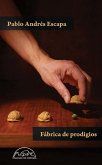A corpse infected with the covid virus lies shrouded on a domestic sofa under a parasol. Next to it a sign says: "We have called 911 and there is no help!" It is morning in Guayaquil during the year 2020. Full pandemic. After the successes of Cockfight and Human Sacrifices, this is a book between autobiography, memory and autofiction, a kind of manifesto crossed by current events that travels through fears and obsessions, experiences and memories of María Fernanda Ampuero. Violence against women. The body outraged, the body rejected. Desire and sexuality. Mental health, obesity, childhood. The mother and maternity wards. Postcolonialism, ecopolitics, feminism. Writing and reading. A monstrously honest, stark, demonic book, with a high degree of furious exhortation. A book by María Fernanda Ampuero.
Hinweis: Dieser Artikel kann nur an eine deutsche Lieferadresse ausgeliefert werden.
Hinweis: Dieser Artikel kann nur an eine deutsche Lieferadresse ausgeliefert werden.








